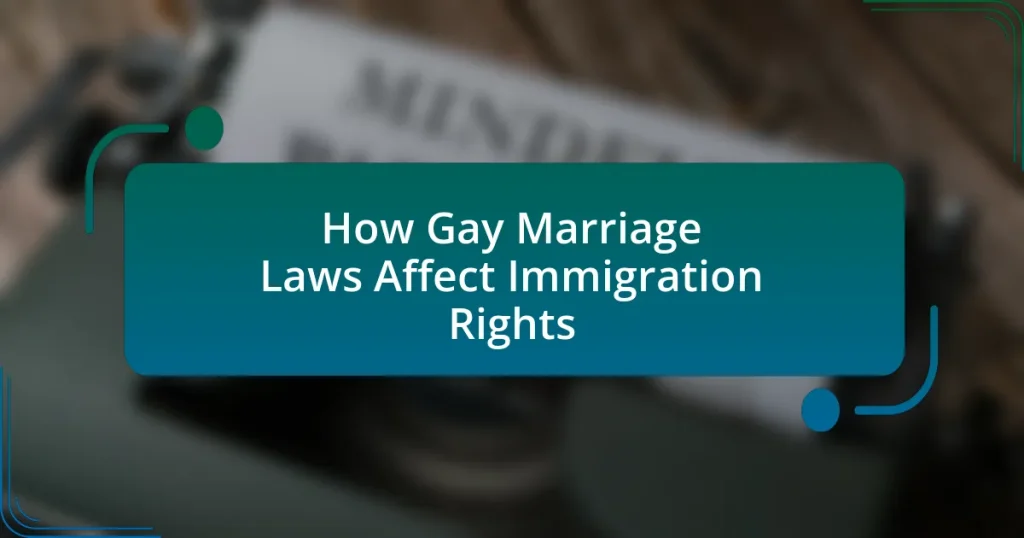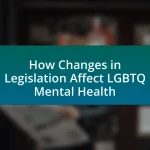The article examines the impact of gay marriage laws on immigration rights, highlighting how legal recognition of same-sex marriages enables couples to sponsor their foreign partners for residency and citizenship. It discusses key legal frameworks, including the Defense of Marriage Act and the Supreme Court’s rulings in Obergefell v. Hodges and United States v. Windsor, which have shaped immigration policies to ensure equal treatment for same-sex couples. The article also addresses the challenges faced by these couples in navigating immigration processes, the role of state laws, and the influence of public perception and advocacy on policy reforms. Additionally, it outlines practical steps and resources available for same-sex couples seeking immigration assistance.
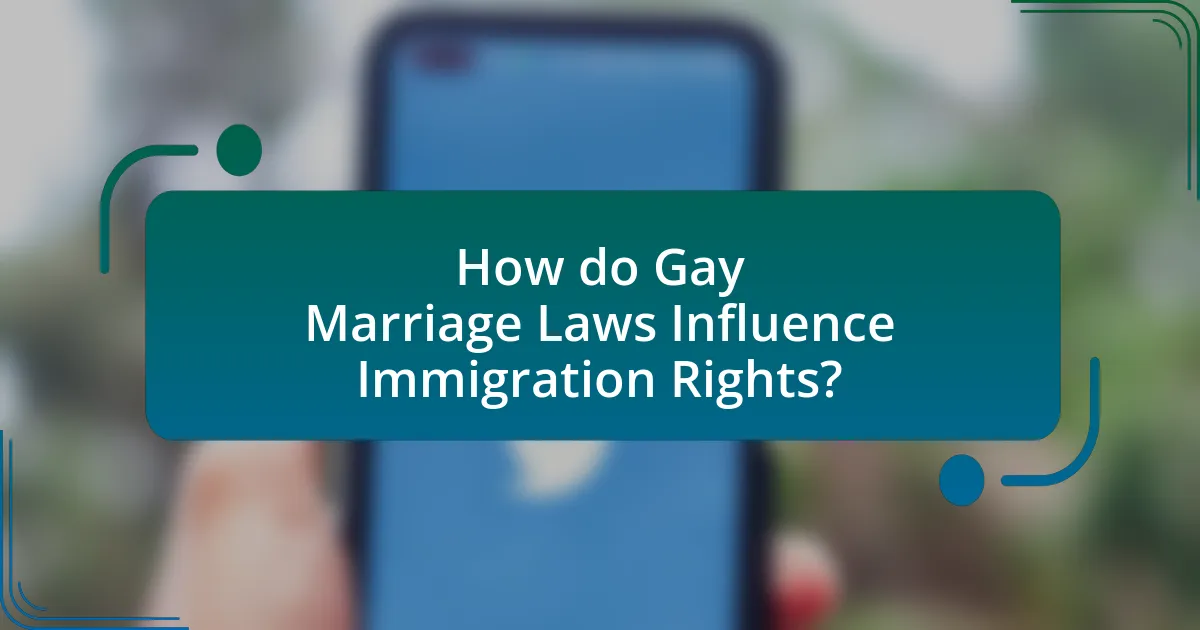
How do Gay Marriage Laws Influence Immigration Rights?
Gay marriage laws significantly influence immigration rights by allowing same-sex couples to sponsor their foreign partners for residency and citizenship. In countries where gay marriage is legalized, such as the United States following the Supreme Court’s 2015 Obergefell v. Hodges decision, same-sex spouses are granted the same immigration benefits as heterosexual couples. This legal recognition enables same-sex couples to navigate immigration processes, including obtaining visas and green cards, thereby enhancing their ability to live together in the same country. The U.S. Citizenship and Immigration Services reported that thousands of same-sex couples have benefited from these provisions, illustrating the direct impact of gay marriage laws on immigration rights.
What are the key legal frameworks surrounding gay marriage and immigration?
The key legal frameworks surrounding gay marriage and immigration include the Defense of Marriage Act (DOMA) and the Supreme Court ruling in Obergefell v. Hodges. DOMA, enacted in 1996, defined marriage as a union between one man and one woman, which affected immigration rights by preventing same-sex couples from obtaining spousal visas. However, the 2015 Supreme Court decision in Obergefell v. Hodges legalized same-sex marriage nationwide, thereby allowing same-sex couples to access immigration benefits similar to heterosexual couples. This ruling invalidated DOMA’s definition, affirming that marriage equality is a constitutional right, which directly impacts immigration rights by enabling same-sex spouses to sponsor their partners for immigration.
How do federal laws address the intersection of gay marriage and immigration?
Federal laws recognize same-sex marriages for immigration purposes, allowing U.S. citizens and lawful permanent residents to sponsor their same-sex spouses for immigration benefits. This recognition stems from the Supreme Court’s 2013 decision in United States v. Windsor, which invalidated the Defense of Marriage Act’s definition of marriage as solely between a man and a woman. Following this ruling, the U.S. Citizenship and Immigration Services (USCIS) began processing immigration applications for same-sex couples on the same basis as opposite-sex couples, ensuring equal treatment under immigration law.
What role do state laws play in shaping immigration rights for same-sex couples?
State laws significantly influence immigration rights for same-sex couples by determining the legal recognition of their marriages. In states that recognize same-sex marriage, couples can access immigration benefits such as spousal visas and residency rights, which are not available in states that do not recognize these unions. For example, the U.S. Supreme Court’s 2015 decision in Obergefell v. Hodges mandated that all states recognize same-sex marriages, but prior to this ruling, state laws varied widely, affecting couples’ immigration status based on their state of residence. Consequently, the interplay between state laws and federal immigration policies directly impacts the rights and opportunities available to same-sex couples seeking to navigate immigration processes.
Why is the recognition of gay marriage important for immigration rights?
The recognition of gay marriage is crucial for immigration rights because it allows same-sex couples to sponsor their spouses for immigration benefits, similar to heterosexual couples. This legal recognition ensures that same-sex partners can navigate immigration processes without facing discrimination or barriers that arise from their marital status. For instance, the U.S. Supreme Court’s 2015 decision in Obergefell v. Hodges established that same-sex marriage is a constitutional right, thereby enabling same-sex couples to access immigration rights that were previously denied. This landmark ruling has led to the inclusion of same-sex spouses in immigration applications, allowing them to obtain visas and residency based on their marital relationship.
How does marriage equality impact visa applications for same-sex couples?
Marriage equality allows same-sex couples to apply for visas as spouses, similar to opposite-sex couples. This legal recognition means that same-sex partners can sponsor each other for immigration benefits, which was not possible in jurisdictions where marriage was not recognized for same-sex couples. For instance, following the U.S. Supreme Court’s decision in Obergefell v. Hodges in 2015, same-sex marriages became legally recognized nationwide, enabling same-sex couples to access spousal visas and other immigration rights that were previously denied. This change has significantly improved the ability of same-sex couples to live together in the same country, thereby enhancing their immigration rights.
What are the implications of marriage recognition on deportation cases?
Marriage recognition significantly impacts deportation cases by providing legal status to non-citizen spouses of citizens or lawful permanent residents. When a marriage is recognized, it allows the non-citizen spouse to apply for adjustment of status, which can prevent deportation. For instance, the U.S. Supreme Court’s decision in United States v. Windsor (2013) invalidated the Defense of Marriage Act, leading to the recognition of same-sex marriages for federal purposes, including immigration benefits. This recognition enables same-sex couples to navigate immigration processes similarly to heterosexual couples, thereby reducing the risk of deportation for non-citizen spouses.
What challenges do same-sex couples face in immigration processes?
Same-sex couples face significant challenges in immigration processes due to varying legal recognition of their relationships across different jurisdictions. Many countries do not recognize same-sex marriages or partnerships, which complicates the ability of couples to obtain spousal visas or residency permits. For instance, in the United States, the Defense of Marriage Act (DOMA) was in effect until 2013, preventing federal recognition of same-sex marriages for immigration purposes. Although DOMA was struck down, inconsistencies remain, as some states still do not recognize same-sex marriages, impacting immigration applications. Additionally, same-sex couples may encounter discrimination or bias during the application process, leading to increased scrutiny and potential denial of visas.
How do discriminatory practices affect immigration rights for gay couples?
Discriminatory practices significantly undermine immigration rights for gay couples by creating barriers to legal recognition and protection. For instance, in countries where same-sex marriage is not recognized, gay couples face challenges in obtaining spousal visas, which are typically granted to heterosexual couples. This lack of recognition can lead to separation, as one partner may be unable to reside legally in the same country as the other. According to a 2018 report by the Williams Institute, same-sex couples are more likely to experience immigration-related challenges compared to heterosexual couples, highlighting the systemic inequalities that arise from discriminatory policies.
What legal battles have shaped the current landscape of gay marriage and immigration?
The legal battles that have shaped the current landscape of gay marriage and immigration include the landmark Supreme Court case Obergefell v. Hodges in 2015, which legalized same-sex marriage nationwide, and the subsequent challenges regarding immigration rights for same-sex couples. Obergefell v. Hodges established that same-sex couples have the constitutional right to marry, which directly impacted immigration policies by allowing U.S. citizens to sponsor their same-sex spouses for immigration benefits. Additionally, cases like Windsor v. United States in 2013, which struck down the Defense of Marriage Act, further reinforced the rights of same-sex couples in immigration contexts. These legal precedents have created a framework that recognizes the marriage rights of same-sex couples, thereby influencing their immigration rights and benefits.
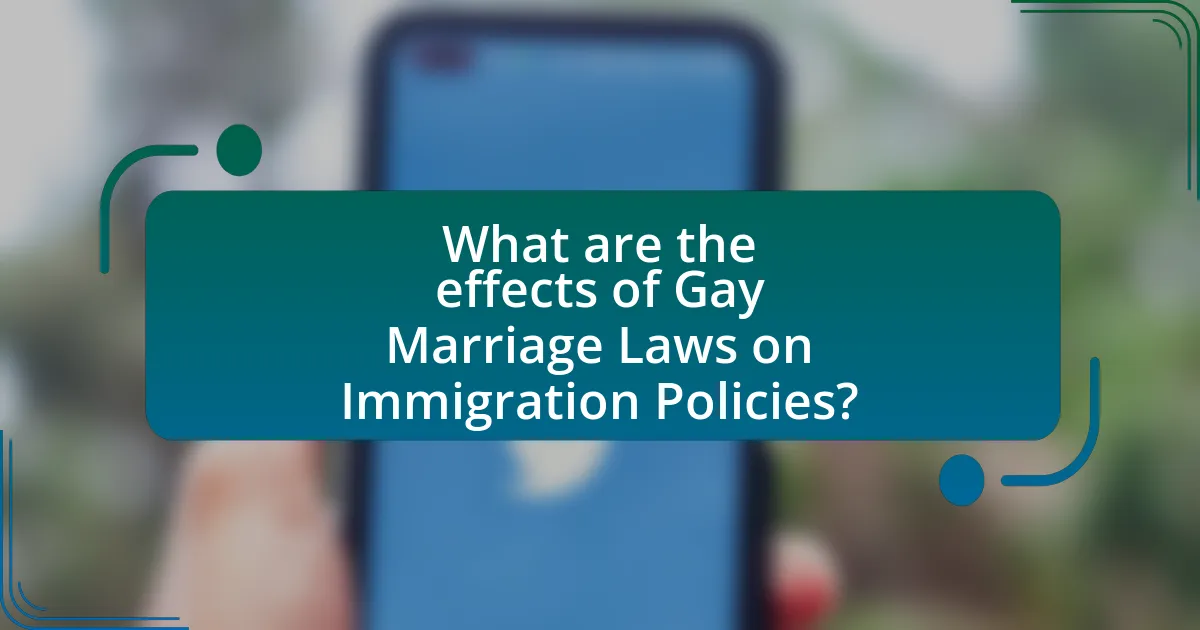
What are the effects of Gay Marriage Laws on Immigration Policies?
Gay marriage laws positively affect immigration policies by allowing same-sex couples to sponsor their foreign partners for residency. This change aligns immigration practices with the recognition of same-sex marriages, as seen in the U.S. Supreme Court’s 2013 decision in United States v. Windsor, which invalidated the Defense of Marriage Act. Following this ruling, the U.S. Citizenship and Immigration Services began recognizing same-sex marriages for immigration purposes, enabling couples to navigate the immigration system similarly to heterosexual couples. This legal recognition has led to increased family unity and the ability for same-sex couples to live together in the same country without facing immigration barriers.
How have recent changes in gay marriage laws affected immigration policies?
Recent changes in gay marriage laws have positively influenced immigration policies by allowing same-sex couples to sponsor their foreign partners for residency. This shift followed the U.S. Supreme Court’s 2015 decision in Obergefell v. Hodges, which legalized same-sex marriage nationwide, thereby granting equal recognition to same-sex marriages in immigration applications. As a result, same-sex spouses can now access the same immigration benefits as heterosexual couples, including the ability to apply for green cards and citizenship for their partners, which was previously denied under the Defense of Marriage Act. This legal recognition has significantly expanded the rights of LGBTQ+ individuals in the immigration process, aligning immigration policies with evolving societal norms regarding marriage equality.
What specific policy changes have been implemented since the legalization of gay marriage?
Since the legalization of gay marriage, specific policy changes include the recognition of same-sex marriages for immigration purposes, allowing spouses of U.S. citizens and lawful permanent residents to apply for visas and green cards. This change aligns with the Supreme Court’s 2013 ruling in United States v. Windsor, which invalidated the Defense of Marriage Act, thereby enabling federal recognition of same-sex marriages. As a result, same-sex couples can now access the same immigration benefits as heterosexual couples, including spousal sponsorship and family reunification.
How do these changes impact the processing of immigration applications?
Changes in gay marriage laws significantly expedite the processing of immigration applications for same-sex couples. When same-sex marriage is recognized, spouses can apply for spousal visas and green cards, which streamlines the immigration process compared to previous regulations that did not recognize these unions. For instance, the U.S. Supreme Court’s 2015 ruling in Obergefell v. Hodges legalized same-sex marriage nationwide, allowing same-sex couples to access the same immigration benefits as heterosexual couples, thereby reducing processing times and increasing approval rates for applications based on marriage.
What are the broader societal implications of these laws on immigration rights?
The broader societal implications of laws on immigration rights, particularly in the context of gay marriage, include increased legal recognition and protection for same-sex couples, which enhances their ability to navigate immigration processes. These laws allow same-sex spouses to sponsor their partners for residency, thereby promoting family unity and stability. For instance, the U.S. Supreme Court’s decision in Obergefell v. Hodges in 2015 legalized same-sex marriage nationwide, leading to significant changes in immigration policies that now recognize same-sex marriages for visa and residency applications. This shift not only affirms the rights of LGBTQ+ individuals but also reflects a broader societal acceptance of diverse family structures, contributing to a more inclusive society.
How do public perceptions of gay marriage influence immigration policy reforms?
Public perceptions of gay marriage significantly influence immigration policy reforms by shaping the political landscape and legislative priorities. As societal acceptance of gay marriage increases, policymakers are more likely to advocate for inclusive immigration policies that recognize same-sex partnerships. For instance, the 2013 Supreme Court decision in United States v. Windsor, which struck down the Defense of Marriage Act, was influenced by changing public attitudes toward gay marriage, leading to the recognition of same-sex marriages for immigration purposes. This shift has resulted in reforms that allow same-sex couples to sponsor their partners for immigration, reflecting a broader trend toward equality in immigration law.
What role does advocacy play in shaping immigration rights for same-sex couples?
Advocacy plays a crucial role in shaping immigration rights for same-sex couples by influencing policy changes and legal recognition. Organizations such as the Human Rights Campaign and Immigration Equality have actively campaigned for the inclusion of same-sex couples in immigration laws, leading to significant legal advancements. For instance, the 2013 Supreme Court decision in United States v. Windsor, which struck down the Defense of Marriage Act, was largely propelled by advocacy efforts that highlighted the inequities faced by same-sex couples in immigration processes. This ruling allowed same-sex spouses to be recognized for immigration benefits, demonstrating how advocacy directly impacts the legal landscape for same-sex couples seeking immigration rights.
How do international perspectives on gay marriage affect U.S. immigration rights?
International perspectives on gay marriage significantly influence U.S. immigration rights by shaping legal frameworks and policies that recognize same-sex partnerships. Countries that have legalized gay marriage often set precedents that encourage the U.S. to adopt more inclusive immigration policies, as seen in the 2013 Supreme Court decision in United States v. Windsor, which invalidated the Defense of Marriage Act. This ruling allowed same-sex couples to access immigration benefits previously denied to them, reflecting a broader trend towards equality influenced by international norms. Furthermore, the U.S. government considers international human rights standards, which increasingly support LGBTQ+ rights, thereby impacting immigration laws and practices.
What can be learned from other countries’ approaches to gay marriage and immigration?
Other countries’ approaches to gay marriage and immigration reveal that legal recognition of same-sex relationships can significantly enhance immigration rights for LGBTQ+ individuals. For instance, countries like Canada and the Netherlands have established policies that allow foreign partners of citizens or residents to obtain residency and citizenship based on their same-sex marriage status. In Canada, the Immigration and Refugee Protection Act explicitly recognizes same-sex spouses, which has led to increased family reunification opportunities for LGBTQ+ couples. Similarly, in the Netherlands, same-sex marriage has been legal since 2001, and this legal framework has facilitated the immigration process for same-sex partners, demonstrating a commitment to equality and human rights. These examples illustrate that comprehensive legal frameworks supporting gay marriage can directly influence and improve immigration rights for same-sex couples.
How do international treaties impact U.S. immigration laws regarding same-sex couples?
International treaties can significantly influence U.S. immigration laws concerning same-sex couples by establishing legal frameworks that promote equality and non-discrimination. For instance, treaties such as the International Covenant on Civil and Political Rights obligate signatory countries, including the U.S., to uphold the rights of individuals regardless of sexual orientation. This international commitment has led to legal precedents that recognize same-sex marriages for immigration purposes, as seen in the 2013 Supreme Court case United States v. Windsor, which invalidated the Defense of Marriage Act. Consequently, same-sex couples are afforded the same immigration benefits as heterosexual couples, reflecting the impact of international human rights standards on domestic law.
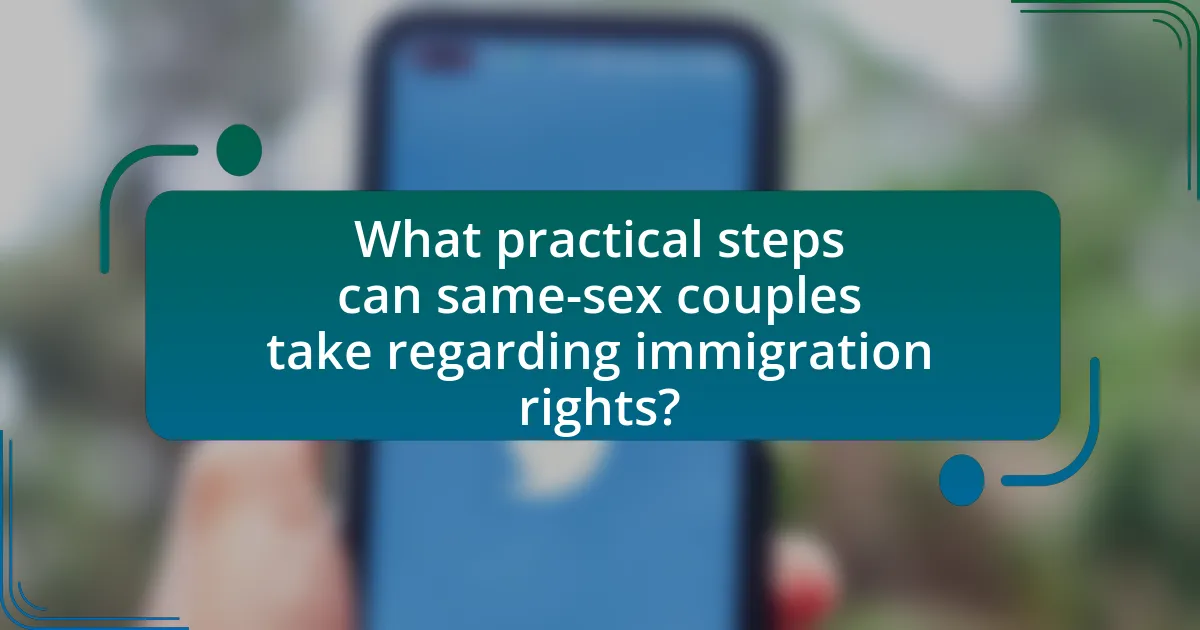
What practical steps can same-sex couples take regarding immigration rights?
Same-sex couples can take several practical steps regarding immigration rights by ensuring they are legally recognized as a married couple in jurisdictions that support same-sex marriage. First, they should obtain a marriage certificate from a state or country that recognizes their union, as this document is essential for immigration applications. Second, they can file for spousal visas or green cards, which are available to legally married couples, allowing one partner to reside in the country of the other.
Additionally, same-sex couples should gather evidence of their relationship, such as joint financial documents, photographs, and affidavits from friends and family, to support their immigration applications. It is also advisable for couples to consult with an immigration attorney who specializes in LGBTQ+ issues to navigate the complexities of immigration law effectively. These steps are crucial because, according to the U.S. Citizenship and Immigration Services, same-sex marriages are treated the same as opposite-sex marriages under federal law, which provides equal immigration rights.
How can same-sex couples navigate the immigration process effectively?
Same-sex couples can navigate the immigration process effectively by ensuring they understand and utilize the legal recognition of their marriage in immigration applications. In many jurisdictions, same-sex marriages are recognized, allowing couples to apply for spousal visas or green cards based on their marital status. For instance, the U.S. Supreme Court’s decision in Obergefell v. Hodges (2015) legalized same-sex marriage nationwide, which means that same-sex couples can now access the same immigration benefits as heterosexual couples. Couples should gather necessary documentation, such as marriage certificates and proof of relationship, and consult with an immigration attorney who specializes in LGBTQ+ issues to ensure compliance with current laws and regulations.
What documentation is necessary for same-sex couples applying for immigration benefits?
Same-sex couples applying for immigration benefits must provide documentation that includes proof of a valid marriage, such as a marriage certificate, and evidence of a bona fide relationship, which can include joint financial documents, photographs together, and affidavits from friends and family. This requirement is based on U.S. immigration law, which recognizes same-sex marriages for immigration purposes following the Supreme Court’s decision in United States v. Windsor in 2013, affirming that same-sex couples are entitled to the same immigration benefits as heterosexual couples.
How can couples prepare for potential legal challenges in their immigration journey?
Couples can prepare for potential legal challenges in their immigration journey by thoroughly documenting their relationship and understanding the legal requirements of their immigration status. This includes gathering evidence such as joint financial records, shared living arrangements, and communication history to demonstrate the authenticity of their relationship, which is crucial for immigration applications. Additionally, couples should stay informed about changes in immigration laws and policies that may affect their case, as legal frameworks can vary significantly based on jurisdiction and recent rulings. For instance, the Supreme Court’s decision in Obergefell v. Hodges established that same-sex marriage is a constitutional right, impacting immigration rights for same-sex couples. Therefore, consulting with an immigration attorney who specializes in LGBTQ+ issues can provide tailored guidance and help navigate potential legal challenges effectively.
What resources are available for same-sex couples seeking immigration assistance?
Same-sex couples seeking immigration assistance can access various resources, including legal aid organizations, government websites, and advocacy groups. Organizations such as the Immigration Equality provide legal support specifically for LGBTQ+ individuals and couples navigating immigration processes. Additionally, the U.S. Citizenship and Immigration Services (USCIS) website offers information on immigration benefits for same-sex spouses, reflecting the legal recognition of same-sex marriage following the Supreme Court’s decision in Obergefell v. Hodges in 2015. Furthermore, local LGBTQ+ community centers often have resources and referrals for immigration assistance tailored to same-sex couples.
Which organizations provide support for LGBTQ+ immigration issues?
Organizations that provide support for LGBTQ+ immigration issues include Immigration Equality, the Human Rights Campaign, and the National Center for Lesbian Rights. Immigration Equality offers legal services and advocacy specifically for LGBTQ+ immigrants and asylum seekers, highlighting their commitment to addressing the unique challenges faced by this community. The Human Rights Campaign works on broader LGBTQ+ rights, including immigration reform, and provides resources and information on navigating immigration processes. The National Center for Lesbian Rights focuses on legal advocacy for LGBTQ+ individuals, including those facing immigration challenges, ensuring their rights are protected under U.S. law.
How can legal professionals assist same-sex couples in immigration matters?
Legal professionals can assist same-sex couples in immigration matters by providing guidance on navigating the complexities of immigration law as it pertains to marriage equality. They can help couples understand their rights under the Defense of Marriage Act (DOMA) and its repeal, which allows same-sex marriages to be recognized for immigration purposes. Legal experts can also assist in preparing and filing necessary documentation, such as spousal visa applications, ensuring compliance with current immigration policies that recognize same-sex marriages. Furthermore, they can represent couples in legal proceedings if issues arise, leveraging case law that supports the rights of same-sex couples in immigration contexts, such as the 2013 Supreme Court decision in United States v. Windsor, which invalidated DOMA’s definition of marriage.
What are the best practices for ensuring a smooth immigration process for same-sex couples?
To ensure a smooth immigration process for same-sex couples, it is essential to gather comprehensive documentation that proves the legitimacy of the relationship. This includes marriage certificates, joint financial statements, and evidence of cohabitation. Additionally, couples should be aware of the specific immigration laws in their destination country, as these can vary significantly; for instance, the U.S. recognizes same-sex marriages for immigration purposes following the Supreme Court’s decision in Obergefell v. Hodges in 2015. Couples should also seek legal advice from immigration attorneys who specialize in LGBTQ+ issues to navigate complex legal requirements effectively. Furthermore, timely submission of applications and adherence to deadlines can prevent unnecessary delays in the immigration process.
